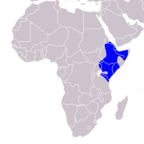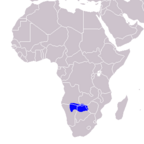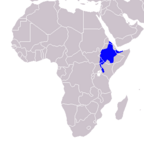List of hornbills

Hornbills are birds in the families Bucerotidae and Bucorvidae. There are currently 62 extant species of hornbills recognised by the International Ornithologists' Union, two in Bucorvidae and 60 in Bucerotidae.[1] Many species of fossil hornbills are known from the Miocene onwards; however, their exact number and taxonomy are unsettled due to ongoing discoveries.
Conventions
[edit]| Conservation status | |
|---|---|
| EX | Extinct (0 species) |
| EW | Extinct in the wild (0 species) |
| CR | Critically Endangered (3 species) |
| EN | Endangered (4 species) |
| VU | Vulnerable (18 species) |
| NT | Near threatened (5 species) |
| LC | Least concern (17 species) |
Conservation status codes listed follow the International Union for Conservation of Nature (IUCN) Red List of Threatened Species. Range maps are provided wherever possible; if a range map is not available, a description of the hornbill's range is provided. Ranges are based on the IOC World Bird List for that species unless otherwise noted. Population estimates are of the number of mature individuals and are taken from the IUCN Red List.
This list follows the taxonomic treatment (designation and order of species) and nomenclature (scientific and common names) of version 13.2 of the IOC World Bird List.[1] Where the taxonomy proposed by the IOC World Bird List conflicts with the taxonomy followed by the IUCN[a] or the 2023 edition of The Clements Checklist of Birds of the World,[3] the disagreement is noted next to the species's common name (for nomenclatural disagreements) or scientific name (for taxonomic disagreements).
Classification
[edit]The International Ornithologists' Union (IOU) recognises 62 species of hornbills in across two families and fifteen genera.[1] This list does not include hybrid species, extinct prehistoric species, or putative species not yet accepted by the IOU.
- Family Bucorvidae
- Genus Bucorvus: two species
- Family Bucerotidae
- Genus Tockus: ten species
- Genus Lophoceros: eight species
- Genus Bycanistes: six species
- Genus Ceratogymna: two species
- Genus Horizocerus: two species
- Genus Berenicornis: one species
- Genus Buceros: three species
- Genus Rhinoplax: one species
- Genus Anthracoceros: five species
- Genus Ocyceros: three species
- Genus Anorrhinus: three species
- Genus Aceros: one species
- Genus Rhyticeros: six species
- Genus Rhabdotorrhinus: four species
- Genus Penelopides: five species
Hornbills
[edit]Bucorvidae
[edit]| Common name | Scientific name and subspecies | Range | IUCN status and estimated population |
|---|---|---|---|
| Abyssinian ground hornbill | B. abyssinicus (Boddaert, 1783) |
Africa | VU
|
| Southern ground hornbill | B. leadbeateri (Vigors, 1825) |
Southern and East Africa
|
VU
|
Bucerotidae
[edit]| Common name | Scientific name and subspecies | Range | IUCN status and estimated population |
|---|---|---|---|
| Tanzanian red-billed hornbill | T. ruahae Kemp and Delport, 2002 |
Central Tanzania | NE
|
| Western red-billed hornbill | T. kempi Tréca & Érard, 2000 |
West Africa | NE
|
| Damara red-billed hornbill | T. damarensis (Shelley, 1888) |
Southern Africa | LC
|
| Southern red-billed hornbill | T. rufirostris (Sundevall, 1850) |
Southern Africa | NE
|
| Northern red-billed hornbill | T. erythrorhynchus (Temminck, 1823) |
Africa
|
NE
|
| Monteiro's hornbill | T. monteiri Hartlaub, 1865 |
Angola and Namibia
|
LC
|
| Von der Decken's hornbill | T. deckeni (Cabanis, 1868) |
East Africa | LC
|
| Jackson's hornbill | T. jacksoni (Ogilvie-Grant, 1891) |
East Africa | LC
|
| Southern yellow-billed hornbill | T. leucomelas (Lichtenstein, M. H. C., 1842) Two subspecies
|
Southern Africa
|
LC
|
| Eastern yellow-billed hornbill | T. flavirostris (Rüppell, 1835) |
East Africa
|
LC
|
| Common name | Scientific name and subspecies | Range | IUCN status and estimated population |
|---|---|---|---|
| Bradfield's hornbill | L. bradfieldi (Roberts, 1930) |
Southern Africa
|
LC
|
| Crowned hornbill | L. alboterminatus Büttikofer, 1889 |
Africa
|
LC
|
| West African pied hornbill | L. semifasciatus (Hartlaub, 1855) |
West Africa | LC
|
| Congo pied hornbill
|
L. fasciatus (Shaw, 1812) |
Central Africa | LC
|
| Hemprich's hornbill | L. hemprichii (Ehrenberg, 1833) |
East Africa
|
LC
|
| African grey hornbill | L. nasutus (Linnaeus, 1766) Two subspecies
|
Africa
|
LC
|
| Red-billed dwarf hornbill | L. camurus (Cassin, 1857) |
East Africa | LC
|
| Pale-billed hornbill | L. pallidirostris (Hartlaub and Finsch, 1870) Two subspecies
|
Southern Africa
|
LC
|
| Common name | Scientific name and subspecies | Range | IUCN status and estimated population |
|---|---|---|---|
| Piping hornbill | B. fistulator (Cassin, 1850) Three subspecies
|
West and Central Africa | LC
|
| Trumpeter hornbill | B. bucinator (Temminck, 1824) |
Southern and East Africa | LC
|
| Brown-cheeked hornbill | B. cylindricus (Temminck, 1831) |
West Africa | VU
|
| White-thighed hornbill | B. albotibialis (Cassin and Reichenow, 1877) |
Central Africa | LC
|
| Black-and-white-casqued hornbill | B. subcylindricus (Sclater, P. L., 1871) Two subspecies
|
Central and West Africa | LC
|
| Silvery-cheeked hornbill | B. brevis Friedmann, 1929 |
East Africa | LC
|
| Common name | Scientific name and subspecies | Range | IUCN status and estimated population |
|---|---|---|---|
| Black-casqued hornbill | C. atrata (Temminck, 1835) |
West and Central Africa | VU
|
| Yellow-casqued hornbill | C. elata (Temminck, 1831) |
West and Central Africa | LC
|
| Common name | Scientific name and subspecies | Range | IUCN status and estimated population |
|---|---|---|---|
| Black dwarf hornbill | H. hartlaubi (Gould, 1861) Two subspecies
|
Central and West Africa
|
LC
|
| White-crested hornbill | H. albocristatus (Cassin, 1848) Three subspecies
|
Central and West Africa | LC
|
| Common name | Scientific name and subspecies | Range | IUCN status and estimated population |
|---|---|---|---|
| White-crowned hornbill | B. comatus (Raffles, 1822) |
Southeast Asia | EN
|
| Common name | Scientific name and subspecies | Range | IUCN status and estimated population |
|---|---|---|---|
| Rhinoceros hornbill | B. rhinoceros Linnaeus, 1758 Three subspecies
|
Southeast Asia | VU
|
| Great hornbill | B. bicornis Linnaeus, 1758 |
South and Southeast Asia | VU
|
| Rufous hornbill | B. hydrocorax Linnaeus, 1766 Three subspecies
|
Philippines | VU |
| Common name | Scientific name and subspecies | Range | IUCN status and estimated population |
|---|---|---|---|
| Helmeted hornbill | R. vigil (Pennant, 1781) |
Southeast Asia | CR
|
| Common name | Scientific name and subspecies | Range | IUCN status and estimated population |
|---|---|---|---|
| Palawan hornbill | A. marchei Oustalet, 1885 |
Palawan and surrounding islands | VU
|
| Oriental pied hornbill | A. albirostris (Shaw, 1808) Two subspecies
|
South and Southeast Asia | LC
|
| Malabar pied hornbill | A. coronatus (Boddaert, 1783) |
India and Sri Lanka | NT
|
| Sulu hornbill | A. montani (Oustalet, 1880) |
Sulu Archipelago | CR
|
| Black hornbill | A. malayanus (Raffles, 1822) |
Southeast Asia | VU
|
| Common name | Scientific name and subspecies | Range | IUCN status and estimated population |
|---|---|---|---|
| Malabar grey hornbill | O. griseus (Latham, 1790) |
Southwestern India | VU
|
| Sri Lanka grey hornbill | O. gingalensis (Shaw, 1812) |
Sri Lanka | LC
|
| Indian grey hornbill | O. birostris (Scopoli, 1786) |
India and Nepal | LC
|
| Common name | Scientific name and subspecies | Range | IUCN status and estimated population |
|---|---|---|---|
| Tickell's brown hornbill | A. tickelli (Blyth, 1855) |
Myanmar and Thailand | NT
|
| Austen's brown hornbill | A. austeni Jerdon, 1872 |
Indochina | NT
|
| Bushy-crested hornbill | A. galeritus (Temminck, 1831) |
Southeast India | NT
|
| Common name | Scientific name and subspecies | Range | IUCN status and estimated population |
|---|---|---|---|
| Rufous-necked hornbill | A. nipalensis (Vigors, 1825) |
Northwest India and Indochina | VU
|
| Common name | Scientific name and subspecies | Range | IUCN status and estimated population |
|---|---|---|---|
| Blyth's hornbill | R. plicatus (Pennant, 1781) |
Moluccas and Oceania | VU
|
| Narcondam hornbill | R. narcondami Hume, 1873 |
Narcondam Island | VU
|
| Wreathed hornbill | R. undulatus (Shaw, 1811) |
South and Southeast Asia | VU
|
| Sumba hornbill | R. everetti Rothschild, 1898 |
Sumba Island | VU
|
| Plain-pouched hornbill | R. subruficollis (Blyth, 1843) |
Southeast Asia | VU
|
| Knobbed hornbill | R. cassidix (Temminck, 1823) |
Sulawesi and surrounding islands | VU
|
| Common name | Scientific name and subspecies | Range | IUCN status and estimated population |
|---|---|---|---|
| Walden's hornbill | R. waldeni (Sharpe, 1877) |
Panay and Negros | CR
|
| Writhed hornbill | R. leucocephalus (Vieillot, 1816) |
Mindanao | NT
|
| Sulawesi hornbill | R. exarhatus (Temminck, 1823) Two subspecies
|
Sulawesi | VU
|
| Wrinkled hornbill | R. corrugatus (Temminck, 1832) |
Southeast Asia | EN
|
| Common name | Scientific name and subspecies | Range | IUCN status and estimated population |
|---|---|---|---|
| Luzon hornbill | P. manillae (Boddaert, 1783) Two subspecies
|
Luzon and surrounding islands | LC
|
| Mindoro hornbill | P. mindorensis Steere, 1890 |
Mindoro | EN
|
| Mindanao hornbill | P. affinis Tweeddale, 1877 Two subspecies
|
Mindanao and surrounding islands | LC
|
| Samar hornbill
|
P. corrugatus Steere, 1890 |
Eastern Visayas | NE
|
| Visayan hornbill | P. panini (Boddaert, 1783) Two subspecies
|
Western Visayas | EN
|
Notes
[edit]- ^ The IUCN follows the taxonomy proposed by the HBW and BirdLife Taxonomic Checklist.[2]
References
[edit]- ^ a b c Gill, F.; Donsker, D.; Rasmussen, P., eds. (July 2023). "Mousebirds, cuckoo roller, trogons, hoopoes, hornbills". IOC World Bird List. v 13.2. Retrieved 7 September 2023.
- ^ "Handbook of the Birds of the World and BirdLife International digital checklist of the birds of the world. Version 7". HBW and BirdLife International. 2022. Archived from the original on 25 September 2019. Retrieved 7 September 2023.
- ^ Clements, James F.; Schulenberg, T. S.; Iliff, M. J.; Fredericks, T. A.; Gerbracht, J. A.; Lepage, Denis; Billerman, S. M.; Sullivan, B. L.; Wood, C. L. (2022). "The eBird/Clements checklist of Birds of the World: v2022". Clements Checklist. Retrieved 7 September 2023.
- ^ BirdLife International (2018). "Bucorvus abyssinicus". IUCN Red List of Threatened Species. 2018: e.T22682632A132204438. doi:10.2305/IUCN.UK.2018-2.RLTS.T22682632A132204438.en. Retrieved 19 November 2021.
- ^ BirdLife International (2016). "Bucorvus leadbeateri". IUCN Red List of Threatened Species. 2016: e.T22682638A92955067. doi:10.2305/IUCN.UK.2016-3.RLTS.T22682638A92955067.en. Retrieved 12 November 2021.
- ^ BirdLife International (2016). "Tockus damarensis". IUCN Red List of Threatened Species. 2016: e.T22725940A94906853. doi:10.2305/IUCN.UK.2016-3.RLTS.T22725940A94906853.en. Retrieved 7 September 2023.
- ^ BirdLife International (2016). "Tockus monteiri". IUCN Red List of Threatened Species. 2016: e.T22682367A92942465. doi:10.2305/IUCN.UK.2016-3.RLTS.T22682367A92942465.en. Retrieved 12 November 2021.
- ^ BirdLife International (2016). "Tockus deckeni". IUCN Red List of Threatened Species. 2016: e.T22682392A92943252. doi:10.2305/IUCN.UK.2016-3.RLTS.T22682392A92943252.en. Retrieved 12 November 2021.
- ^ BirdLife International (2016). "Tockus jacksoni". IUCN Red List of Threatened Species. 2016: e.T22682388A92943069. doi:10.2305/IUCN.UK.2016-3.RLTS.T22682388A92943069.en. Retrieved 12 November 2021.
- ^ BirdLife International (2016). "Tockus leucomelas". IUCN Red List of Threatened Species. 2016: e.T22682384A92942849. doi:10.2305/IUCN.UK.2016-3.RLTS.T22682384A92942849.en. Retrieved 12 November 2021.
- ^ BirdLife International (2016). "Tockus flavirostris". IUCN Red List of Threatened Species. 2016: e.T22682379A92942633. doi:10.2305/IUCN.UK.2016-3.RLTS.T22682379A92942633.en. Retrieved 13 November 2021.
- ^ BirdLife International (2016). "Lophoceros bradfieldi". IUCN Red List of Threatened Species. 2016: e.T22682400A92943713. doi:10.2305/IUCN.UK.2016-3.RLTS.T22682400A92943713.en. Retrieved 11 November 2021.
- ^ BirdLife International (2016). "Lophoceros alboterminatus". IUCN Red List of Threatened Species. 2016: e.T22682396A92943440. doi:10.2305/IUCN.UK.2016-3.RLTS.T22682396A92943440.en. Retrieved 12 November 2021.
- ^ BirdLife International (2017). "Lophoceros semifasciatus". IUCN Red List of Threatened Species. 2017: e.T61612971A118859362. doi:10.2305/IUCN.UK.2017-3.RLTS.T61612971A118859362.en. Retrieved 16 July 2023.
- ^ BirdLife International (2016). "Lophoceros fasciatus". IUCN Red List of Threatened Species. 2016: e.T61612961A95171708. doi:10.2305/IUCN.UK.2016-3.RLTS.T61612961A95171708.en. Retrieved 12 November 2021.
- ^ BirdLife International (2018). "Lophoceros hemprichii". IUCN Red List of Threatened Species. 2018: e.T22682409A130080934. doi:10.2305/IUCN.UK.2018-2.RLTS.T22682409A130080934.en. Retrieved 12 November 2021.
- ^ BirdLife International (2016). "Lophoceros nasutus". IUCN Red List of Threatened Species. 2016: e.T22682413A92944101. doi:10.2305/IUCN.UK.2016-3.RLTS.T22682413A92944101.en. Retrieved 12 November 2021.
- ^ BirdLife International (2018). "Lophoceros camurus". IUCN Red List of Threatened Species. 2018: e.T22682363A130080398. doi:10.2305/IUCN.UK.2018-2.RLTS.T22682363A130080398.en. Retrieved 13 November 2021.
- ^ BirdLife International (2016). "Lophoceros pallidirostris". IUCN Red List of Threatened Species. 2016: e.T22682417A92944515. doi:10.2305/IUCN.UK.2016-3.RLTS.T22682417A92944515.en. Retrieved 11 November 2021.
- ^ BirdLife International (2018). "Bycanistes fistulator". IUCN Red List of Threatened Species. 2018: e.T22725962A132234122. doi:10.2305/IUCN.UK.2018-2.RLTS.T22725962A132234122.en. Retrieved 12 November 2021.
- ^ BirdLife International (2018). "Bycanistes bucinator". IUCN Red List of Threatened Species. 2018: e.T22682548A130081383. doi:10.2305/IUCN.UK.2018-2.RLTS.T22682548A130081383.en. Retrieved 13 November 2021.
- ^ BirdLife International (2018). "Bycanistes cylindricus". IUCN Red List of Threatened Species. 2018: e.T22682585A129918692. doi:10.2305/IUCN.UK.2018-2.RLTS.T22682585A129918692.en. Retrieved 12 November 2021.
- ^ BirdLife International (2016). "Bycanistes albotibialis". IUCN Red List of Threatened Species. 2016: e.T22682609A92953893. doi:10.2305/IUCN.UK.2016-3.RLTS.T22682609A92953893.en. Retrieved 12 November 2021.
- ^ BirdLife International (2017). "Bycanistes subcylindricus". IUCN Red List of Threatened Species. 2017: e.T22682577A111897019. doi:10.2305/IUCN.UK.2017-1.RLTS.T22682577A111897019.en. Retrieved 12 November 2021.
- ^ BirdLife International (2018). "Bycanistes brevis". IUCN Red List of Threatened Species. 2018: e.T22682570A130081772. doi:10.2305/IUCN.UK.2018-2.RLTS.T22682570A130081772.en. Retrieved 12 November 2021.
- ^ BirdLife International (2016). "Ceratogymna atrata". IUCN Red List of Threatened Species. 2016: e.T22682621A92954110. doi:10.2305/IUCN.UK.2016-3.RLTS.T22682621A92954110.en. Retrieved 11 November 2021.
- ^ BirdLife International (2016). "Ceratogymna elata". IUCN Red List of Threatened Species. 2016: e.T22682627A92954374. doi:10.2305/IUCN.UK.2016-3.RLTS.T22682627A92954374.en. Retrieved 12 November 2021.
- ^ BirdLife International (2016). "Horizocerus hartlaubi". IUCN Red List of Threatened Species. 2016: e.T22727003A94938049. doi:10.2305/IUCN.UK.2016-3.RLTS.T22727003A94938049.en. Retrieved 13 November 2021.
- ^ BirdLife International (2016). "Horizocerus albocristatus". IUCN Red List of Threatened Species. 2016: e.T22725946A94907044. doi:10.2305/IUCN.UK.2016-3.RLTS.T22725946A94907044.en. Retrieved 12 November 2021.
- ^ BirdLife International (2018). "Berenicornis comatus". IUCN Red List of Threatened Species. 2018: e.T22682507A132272549. doi:10.2305/IUCN.UK.2018-2.RLTS.T22682507A132272549.en. Retrieved 15 November 2021.
- ^ BirdLife International (2020). "Buceros rhinoceros". IUCN Red List of Threatened Species. 2020: e.T22682450A184960407. doi:10.2305/IUCN.UK.2020-3.RLTS.T22682450A184960407.en. Retrieved 18 November 2021.
- ^ BirdLife International (2020). "Buceros bicornis". IUCN Red List of Threatened Species. 2020: e.T22682453A184603863. doi:10.2305/IUCN.UK.2020-3.RLTS.T22682453A184603863.en. Retrieved 18 January 2022.
- ^ BirdLife International (2020). "Buceros hydrocorax". IUCN Red List of Threatened Species. 2020: e.T22727019A184595905. doi:10.2305/IUCN.UK.2020-3.RLTS.T22727019A184595905.en. Retrieved 18 January 2022.
- ^ BirdLife International (2020). "Buceros mindanensis". IUCN Red List of Threatened Species. 2020: e.T22727029A184597693. doi:10.2305/IUCN.UK.2020-3.RLTS.T22727029A184597693.en. Retrieved 18 January 2022.
- ^ BirdLife International (2020). "Rhinoplax vigil". IUCN Red List of Threatened Species. 2020: e.T22682464A184587039. doi:10.2305/IUCN.UK.2020-3.RLTS.T22682464A184587039.en. Retrieved 19 November 2021.
- ^ BirdLife International (2016). "Anthracoceros marchei". IUCN Red List of Threatened Species. 2016: e.T22682444A92946182. doi:10.2305/IUCN.UK.2016-3.RLTS.T22682444A92946182.en. Retrieved 12 November 2021.
- ^ BirdLife International (2020). "Anthracoceros albirostris". IUCN Red List of Threatened Species. 2020: e.T22682437A184925767. doi:10.2305/IUCN.UK.2020-3.RLTS.T22682437A184925767.en. Retrieved 26 January 2022.
- ^ BirdLife International (2016). "Anthracoceros coronatus". IUCN Red List of Threatened Species. 2016: e.T22682433A92945240. doi:10.2305/IUCN.UK.2016-3.RLTS.T22682433A92945240.en. Retrieved 13 November 2021.
- ^ BirdLife International (2020). "Anthracoceros montani". IUCN Red List of Threatened Species. 2020: e.T22682447A178062684. doi:10.2305/IUCN.UK.2020-3.RLTS.T22682447A178062684.en. Retrieved 12 November 2021.
- ^ BirdLife International (2018). "Anthracoceros malayanus". IUCN Red List of Threatened Species. 2018: e.T22682441A132372259. doi:10.2305/IUCN.UK.2018-2.RLTS.T22682441A132372259.en. Retrieved 18 November 2021.
- ^ BirdLife International (2020). "Ocyceros griseus". IUCN Red List of Threatened Species. 2020: e.T22682421A182384253. doi:10.2305/IUCN.UK.2020-3.RLTS.T22682421A182384253.en. Retrieved 19 November 2021.
- ^ BirdLife International (2020). "Ocyceros gingalensis". IUCN Red List of Threatened Species. 2020: e.T22682425A184955003. doi:10.2305/IUCN.UK.2020-3.RLTS.T22682425A184955003.en. Retrieved 11 November 2021.
- ^ BirdLife International (2020). "Ocyceros birostris". IUCN Red List of Threatened Species. 2020: e.T22682429A184951065. doi:10.2305/IUCN.UK.2020-3.RLTS.T22682429A184951065.en. Retrieved 12 November 2021.
- ^ BirdLife International (2020). "Anorrhinus tickelli". IUCN Red List of Threatened Species. 2020: e.T22731946A183158357. doi:10.2305/IUCN.UK.2020-3.RLTS.T22731946A183158357.en. Retrieved 11 November 2021.
- ^ BirdLife International (2018). "Anorrhinus austeni". IUCN Red List of Threatened Species. 2018: e.T22731941A131871758. doi:10.2305/IUCN.UK.2018-2.RLTS.T22731941A131871758.en. Retrieved 12 November 2021.
- ^ BirdLife International (2020). "Anorrhinus galeritus". IUCN Red List of Threatened Species. 2020: e.T22682485A177973137. doi:10.2305/IUCN.UK.2020-3.RLTS.T22682485A177973137.en. Retrieved 16 November 2021.
- ^ BirdLife International (2020). "Aceros nipalensis". IUCN Red List of Threatened Species. 2020: e.T22682510A176267243. Retrieved 26 January 2022.
- ^ BirdLife International (2020). "Rhyticeros plicatus". IUCN Red List of Threatened Species. 2020: e.T22682544A184674368. doi:10.2305/IUCN.UK.2020-3.RLTS.T22682544A184674368.en. Retrieved 12 November 2021.
- ^ BirdLife International (2020). "Rhyticeros narcondami". IUCN Red List of Threatened Species. 2020: e.T22682531A182554475. doi:10.2305/IUCN.UK.2020-3.RLTS.T22682531A182554475.en. Retrieved 12 November 2021.
- ^ BirdLife International (2018). "Rhyticeros undulatus". IUCN Red List of Threatened Species. 2018: e.T22682528A132400385. doi:10.2305/IUCN.UK.2018-2.RLTS.T22682528A132400385.en. Retrieved 26 January 2022.
- ^ BirdLife International (2020). "Rhyticeros everetti". IUCN Red List of Threatened Species. 2020: e.T22682535A184201170. doi:10.2305/IUCN.UK.2020-3.RLTS.T22682535A184201170.en. Retrieved 20 November 2021.
- ^ BirdLife International (2017). "Rhyticeros subruficollis". IUCN Red List of Threatened Species. 2017: e.T22682541A117572163. doi:10.2305/IUCN.UK.2017-3.RLTS.T22682541A117572163.en. Retrieved 13 November 2021.
- ^ BirdLife International (2017). "Rhyticeros cassidix". IUCN Red List of Threatened Species. 2017: e.T22682525A117182222. doi:10.2305/IUCN.UK.2017-3.RLTS.T22682525A117182222.en. Retrieved 19 November 2021.
- ^ BirdLife International (2018). "Rhabdotorrhinus waldeni". IUCN Red List of Threatened Species. 2018: e.T22682517A125519634. doi:10.2305/IUCN.UK.2016-3.RLTS.T22682517A125519634.en. Retrieved 13 November 2021.
- ^ BirdLife International (2020). "Rhabdotorrhinus leucocephalus". IUCN Red List of Threatened Species. 2020: e.T22682522A184689600. doi:10.2305/IUCN.UK.2020-3.RLTS.T22682522A184689600.en. Retrieved 12 November 2021.
- ^ BirdLife International (2022). "Rhabdotorrhinus exarhatus". IUCN Red List of Threatened Species. 2022: e.T22682504A210091404. doi:10.2305/IUCN.UK.2022-1.RLTS.T22682504A210091404.en. Retrieved 12 November 2021.
- ^ BirdLife International (2018). "Rhabdotorrhinus corrugatus". IUCN Red List of Threatened Species. 2018: e.T22682514A132244524. doi:10.2305/IUCN.UK.2018-2.RLTS.T22682514A132244524.en. Retrieved 18 November 2021.
- ^ BirdLife International (2020). "Penelopides manillae". IUCN Red List of Threatened Species. 2020: e.T22682488A184676809. doi:10.2305/IUCN.UK.2020-3.RLTS.T22682488A184676809.en. Retrieved 12 November 2021.
- ^ BirdLife International (2020). "Penelopides mindorensis". IUCN Red List of Threatened Species. 2020: e.T22682491A184680868. doi:10.2305/IUCN.UK.2020-3.RLTS.T22682491A184680868.en. Retrieved 13 November 2021.
- ^ BirdLife International (2020). "Penelopides affinis". IUCN Red List of Threatened Species. 2020: e.T61623294A184679044. doi:10.2305/IUCN.UK.2020-3.RLTS.T61623294A184679044.en. Retrieved 11 November 2021.
- ^ BirdLife International (2020). "Penelopides panini". IUCN Red List of Threatened Species. 2020: e.T22682494A184683355. doi:10.2305/IUCN.UK.2020-3.RLTS.T22682494A184683355.en. Retrieved 12 November 2021.




























































